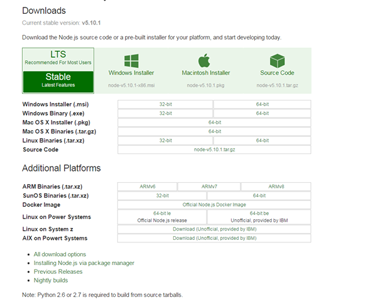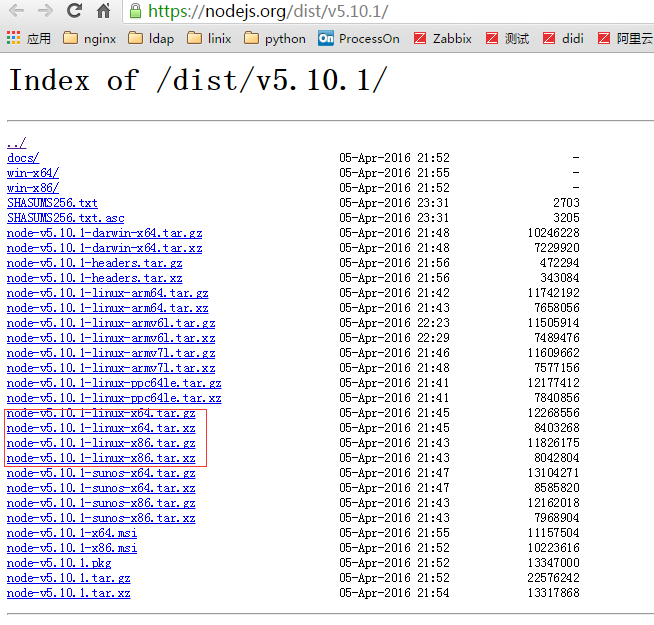
I have installed node under Windows and Mac before, and it feels very convenient. Unexpectedly, it took me a long time to install it under Linux today, so I will record it here.
First go to the official website to download the code. Here you must note that there are two types of installation, one is the Source Code source code, and the other is the compiled file. I just followed the installation method of the online source code to operate the compiled files, but I was stuck for a long time.


(1) Compiled files
The ones in the red box in the picture above are already compiled file, select the corresponding Linux version and download it. Simply put, after decompression, node and npm already exist in the bin folder. If you enter the corresponding file and execute the command line, there will be no problem at all, but it is not global. So just set this as global by establishing a soft link.
tar xf node-v5.10.1-linux-x64.tar.gz -C /usr/local/ cd /usr/local/ mv node-v5.10.1-linux-x64/ nodejs ln -s /usr/local/nodejs/bin/node /usr/local/bin ln -s /usr/local/nodejs/bin/npm /usr/local/bin
(2) Compile through source code
The file you download in this way is Source code, because my Linux version is 6. x, the default gcc-c++ is version 4.4.7, and after downloading it, the source code compilation requires the gcc-c++ version to be at least 4.8, so I upgraded the GCC-C++ version. As a result, the source code compilation upgraded GCC-C++ and compiled After more than an hour, the compilation was not completed! I was decisively tricked...
root># ./configure WARNING: C++ compiler too old, need g++ 4.8 or clang++ 3.4 (CXX=g++) creating ./icu_config.gypi { 'target_defaults': { 'cflags': [], 'default_configuration': 'Release', 'defines': [], 'include_dirs': [], 'libraries': []}, 'variables': { 'asan': 0, 'gas_version': '2.20', 'host_arch': 'x64', 'icu_small': 'false', 'node_byteorder': 'little', 'node_install_npm': 'true', 'node_prefix': '/usr/local', 'node_release_urlbase': '', 'node_shared_http_parser': 'false', 'node_shared_libuv': 'false', 'node_shared_openssl': 'false', 'node_shared_zlib': 'false', 'node_tag': '', 'node_use_dtrace': 'false', 'node_use_etw': 'false', 'node_use_lttng': 'false', 'node_use_openssl': 'true', 'node_use_perfctr': 'false', 'openssl_fips': '', 'openssl_no_asm': 0, 'target_arch': 'x64', 'uv_parent_path': '/deps/uv/', 'uv_use_dtrace': 'false', 'v8_enable_gdbjit': 0, 'v8_enable_i18n_support': 0, 'v8_no_strict_aliasing': 1, 'v8_optimized_debug': 0, 'v8_random_seed': 0, 'v8_use_snapshot': 'true', 'want_separate_host_toolset': 0}} creating ./config.gypi creating ./config.mk WARNING: warnings were emitted in the configure phase
(3) apt-get
There is another way It is the apt-get method under Ubuntu. I have been fooled by this method before
sudo apt-get install nodejs sudo apt-get install npm
After installing like this, you will find that the node command is not good So, the nodejs command can be used...
The above is the entire content of this article. I hope it will be helpful to everyone's learning, and I also hope that everyone will support the PHP Chinese website.
For more articles related to Nodejs installation steps under Linux, please pay attention to the PHP Chinese website!




